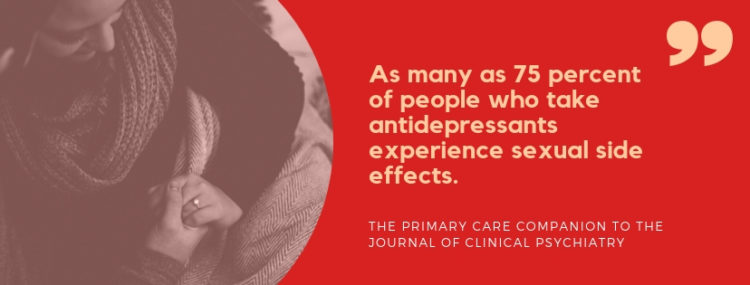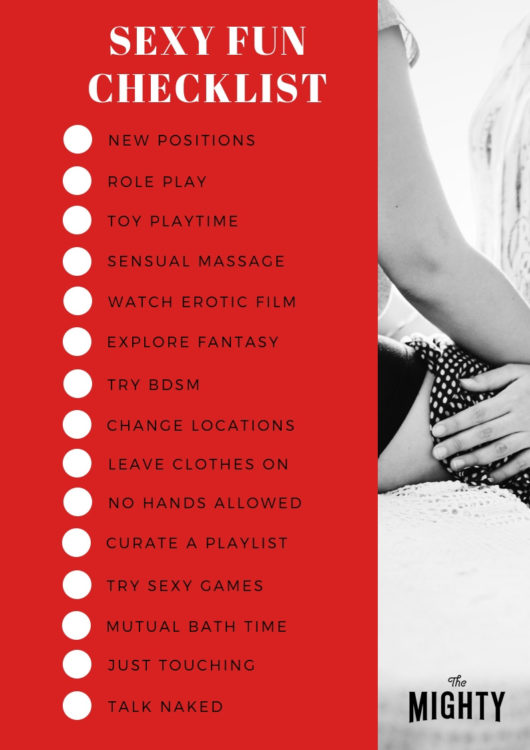Here's How Antidepressants Are Hijacking Your Sex Life, and What You Can Do About It
Sex is a lot of things. It’s a way to intimately connect with a partner both emotionally and physically. It’s a way to get a workout or release some pent-up energy. Plus, it’s good for your health. Orgasms have a variety of health benefits from reducing stress to improving women’s cardiovascular health. It can also be fun.
When you’re struggling with your mental health, however, your desire to rumble in the sheets may dim, and taking antidepressants doesn’t always help. That’s why, for many people, one of the worst parts of taking antidepressants are the sexual side effects. Sexual side effects impact as many as 75 percent of people who take antidepressants.
How Antidepressants Affect Sex Drive
Sex essentially happens in four stages — desire, our interest in having sex in the near future; arousal, when we’re physically in the zone; orgasm; and resolution or recovery. Antidepressants can impact any of these stages, which is unfortunate considering that sex and intimacy can boost your mood when you’re dealing with a mental illness.
Johnny Williamson, MD, a psychiatrist and medical director at Timberline Knolls in Illinois, told The Mighty antidepressant side effects may include “erectile dysfunction and delayed ejaculation, painful ejaculation and decreased sexual excitement.” You might experience smaller orgasms, it can take longer to have an orgasm and you may feel less sensation in your genitals. Mighty contributor Laura Bower shared how several of these symptoms impacted her sex life in her article, “When Antidepressants Give You a ‘Numb Vagina’“:
After just a week of being on my medication, I was already noticing a change in my mental clarity but I also noticed a huge change in my sex life. My sex drive took a dive, but also something else happened: it was incredibly difficult for me to achieve an orgasm — something I never had a problem with before. While sex still felt good, it felt like my vagina was literally numb and achieving orgasm took much, much longer. This became incredibly frustrating, as you may imagine, and I wasn’t sure if taking an antidepressant would be worth the sacrifice of my sex life.
Why You May Have Sexual Side Effects
As frustrating as these side effects can be, there’s likely a chemical reason why antidepressants are out for your sexy times. However, according to Williamson, “the mechanism involved in sexual dysfunction [is] poorly understood.” Research indicates that most antidepressants — selective serotonin reuptake inhibitors (SSRI) and serotonin-norepinephrine reuptake inhibitors (SNRI) in particular — work for mental health because they boost your levels of the “happy” neurotransmitter serotonin, thus improving your mood.

An increased amount of serotonin, however, also messes with the desire and arousal stages of your sex drive. It can dampen your interest in sex and reduce the physical sensations you feel. Scientists think this might be because having more serotonin pushes out the other “feel-good” neurotransmitters dopamine and norepinephrine. When this balance changes, it affects your sexual arousal and pleasure.
Though issues with sex are certainly a frequent side effect of antidepressants, don’t rule out other drug side effects that can lower your libido. Some medications may cause weight gain, fatigue, nausea and other side effects that can make sex less appealing.
When Antidepressants Help
Meds don’t always have a negative impact. Depression and other mental illnesses may decrease your interest in sex, just like they decrease your interest in other activities you enjoy. One study found that 35 to 50 percent of those with depression had trouble with sex before they started treatment. From this perspective, an antidepressant treatment, if it’s right for you, can increase your energy and your sex drive.
How To Take Back Your Sex Life
Not everyone experiences sexual antidepressant side effects and sometimes they wear off after a few months. Regardless, if you want to get your verve back in the bedroom, here are eight ways you can reclaim your sex life from antidepressants.
1. Track Your Sex Life
To get to the bottom of what’s happening in your sex life, keep tabs on your sex drive. Start tracking any sex-related symptoms early on — even before you start taking meds if possible. How often do you have sex or masturbate? How often do you feel turned on and when? What were you doing right before? Did you notice anything that was stimulating? What other stressors are going on in your life, like a job change or difficult school semester, that might make you less interested in sex?
Add anything to your tracking you can think of that seems relevant and look for patterns. There are a variety of apps that can help you get started if that’s helpful. Loop in a partner, which can also be a fun way to get to know each other’s sexual preferences better.
2. Boost Your Basics
Maximize your sex drive potential by going back to basics. “I recommend regular exercise, healthy diet and meditation,” certified sex coach Stephanie Hunter Jones told The Mighty. “Unhealthy habits (over-stressing, smoking, illegal drugs and excess alcohol) all diminish your sex drive.” The more regulated your body is, including your sleep schedule, the better chances your sex drive will lift with the rest of your physical health.
Exercise is especially important. When going to the gym or hitting the pavement doesn’t sound appealing, studies show that many women taking antidepressants had the highest sexual desire immediately after a good workout.
3. ‘Get the Joy of Rediscovering You’
Listen, Journey maybe didn’t mean “Get the joy of rediscovering you” this way, but lyrics from a classic rock song like “Faithfully” are perfect for this topic. Get all up in your own business and discover what feels good. Find the zones all over your body — not just in the pelvic region — that give you shivers and tingles. Try different masturbation techniques (toys and lube!) to investigate uncharted territory.
Despite the effects of medication, maybe you do get turned on, it just takes some extra stroking. You may find some new spots that help get you going. Maybe you don’t orgasm from penetration while on antidepressants, but clitoral stimulation does the trick. See if you can discover new ways around some of your antidepressant side effects, without the pressure of performing for a partner.
4. Communication Is Key
It’s good advice in any situation: Communicate your needs. Talk to your partner, whether they’re with you for a quick romp or in it for the long haul. You don’t have to disclose you’re taking antidepressants if you don’t want to, but you have every right to be assertive about what feels good to you during sex. Tell your partner if you’d like more foreplay before getting to the main event or need a particular kind of stimulation.
In a long-term relationship, you may decide to loop in your partner on how antidepressants — or your mental health — impact your sex life. Antidepressants and sexual side effects involve both of you when you’re in a relationship. Brainstorm ways you can have a successful experience together. There may also be times when sex is completely off the table for you. That’s OK. Talk to your partner.
5. Set a Schedule
Putting sexy times on the calendar may not seem super romantic, but it can help get you in bed more consistently. “Intimacy is just like everything else in life, you have to schedule it,” Hunter Jones told The Mighty. “Many individuals believe it is not organic or natural if it is scheduled, but the reality is, in our busy lives, whatever is a priority must be put in the books.”
A scheduled session takes the pressure off and eliminates some of the frustration of not always feeling spontaneously in the mood. Plus, when you know it’s coming, you can prepare ahead of time. You may find that taking your antidepressant long before you have sex helps get you in the mood. Or maybe going for a run right before your scheduled time between the sheets boosts your desire. Use your tracking information and talk to your partner to find what’s going to work.
6. Think Outside the Box
Like spending time getting to know yourself better, experiment with new ways to be sexual or intimate that don’t always rely on having an orgasm. Try a range of sexy time activities. Give different positions a go and bring your sexual fantasies to life. Spend more time focusing on foreplay or physical closeness. Think outside the box and be creative.

(Click here for a downloadable version of the checklist.)
“Remember that penetration and orgasm are a very small part of sex and your sexuality,” Hunter Jones said. “Stop taking sex so seriously. Invite fun back into the bedroom. Get out of your comfort zone and experiment. Enhance teasing, massaging, role-playing, games, maybe open yourself up to some light BDSM play. Depending on your and your partner’s comfort level, introduce erotic films, books, porn, lube and toys.”
7. Consider (Sex) Therapy
Hunter Jones highlighted that many times sexuality begins in the mind. Shame and low self-esteem or trauma, for example, may put a damper on your sex life. By working through these issues with a therapist — or sex therapist — you’ll work through mental health-related barriers that may be blocking your sex life.
Talk to your current counselor about the sex issues you’re experiencing if you feel comfortable. Most therapists are willing and able to work with you on sexual topics. To find a therapist specifically trained in sexual health, you can use the American Association of Sexuality Educators, Counselors and Therapists’ (AASECT) search tool. Professionals listed on AASECT’s website have gone through expert training to ensure they will treat you with respect and maintain appropriate boundaries, just like any therapist should.
8. Talk to Your Doctor
Bring up any side effects, including the sexual ones, with your doctor. Doctors might be able to switch your meds to ones with fewer side effects. You can also ask about adding another medication to counteract sexual side effects. Williamson said drugs like sildenafil (brand name Viagra) and tadalafil (brand name Cialis) can help with erectile dysfunction. Antidepressants bupropion (brand name Wellbutrin) and buspirone (brand name BuSpar) have shown positive results in the sex department for many as well.
Before trying any natural remedies, such as ArginMax, Zestra or St. John’s Wort, talk to your doctor first. Though they’re available over the counter, these products can still interact with your prescription medications. You may also hear about taking a “drug holiday,” a temporary halt of your antidepressants. Consult with a doctor if you’re considering this option because a drug holiday may cause other side effects or withdrawal symptoms.
It might be uncomfortable, but if antidepressants put a dent in your sex life, a conversation with the doc may help. “Be open and honest with your doctor regarding your concerns of the sexual side effects,” Hunter Jones told The Mighty. “Each of us is entitled to a healthy sex life, so speak up regarding your concerns with your doctor.”
Header image via Priscilla Du Preez/Unsplash.

